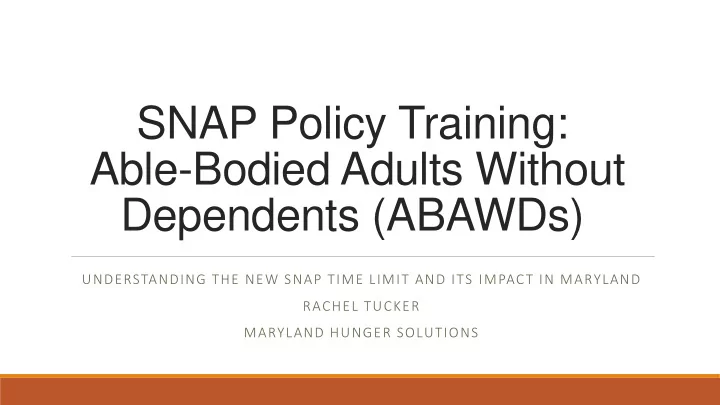

SNAP Policy Training: Able-Bodied Adults Without Dependents (ABAWDs) UNDERSTANDING THE NEW SNAP TIME LIMIT AND ITS IMPACT IN MARYLAND RACHEL TUCKER MARYLAND HUNGER SOLUTIONS
• A Timeline of the SNAP Time Limit and Reimplementation • Who is (or is not) an Able-Bodied Adult Training Without Dependents? Overview • Defining ABAWDs – Key Criteria • Identifying Eligible Exemptions • The Impact of the SNAP Time Limit in Maryland • Next Steps for Community Partners • Opportunities for SNAP outreach
How Did We Get Here? An Overview of the SNAP Time Limit • The 3 month SNAP time limit emerged from the passage of the Welfare Reform Act of 1996. • Under federal law, individuals identified as Able-Bodied Adults Without Dependents (ABAWDs) are entitled to a maximum of 3 months of SNAP benefits in a 36 month time period. • ABAWDs are defined as follows: • Between the ages of 18-49 • Not disabled • Not living with a dependent child under age 18 • Since the 1990s, most states have granted partial or statewide waivers from the time limit. • In 2016, over 40 states will reimplement the SNAP time limit, including 23 states that will be reimplementing it for the first time since the recession. • Maryland's last statewide waiver expired January 1st, 2016 and thousands could be impacted by this change. •
Defining ABAWDs – Key Criteria Who Is (or is not) an Able-Bodied Adult Able-Bodied Adults Without Without Dependents? Dependents meet the following criteria: Able-Bodied Adults ◦ Age 18-49 Without Dependents (ABAWDs) - Eligibility for ◦ Not disabled SNAP is limited to 3 ◦ Not living with a dependent child months in a 36 month under the age of 18 period.
ABAWD Demographic Data - Impacted individuals are extremely poor - Over 80% of those subject to the time limit have incomes below 50% of poverty - SNAP is the primary benefit available to most unemployed, childless workers
ABAWD Demographic Data
• Under age 16 or over age 50 • Living with a child under age 18. • Caring for a disabled person. Who Is NOT An • Homeless, “doubled up,” or don’t have a regular and Able Bodied adequate nighttime residence. Adult Without • Women who are pregnant. Dependents? • Participating in a drug or alcohol treatment or rehabilitation program. • Enrolled in school or vocational training at least half time. Identifying • Participating in combination of employment, job training, Eligible volunteering and job search activities, for a total of at least 20 hours per week (average of 80 hours per month). Exemptions • H ave applied for or are receiving unemployment compensation. • Medically verified as mentally or physically unfit for work
The time limit is in effect in the following counties, impacting thousands of Marylanders statewide: • Anne Arundel County • Baltimore County The Impact in • Carroll County • Howard County Maryland: • Frederick County • Montgomery County • Prince George's County • Washington County Understanding the States have the option to waive the ABAWD time limit in areas of high Local Effect of the unemployment or in areas that lack sufficient jobs. Time Limit In most cases, ABAWD time limit waivers are granted for a 1 year period. The following areas are exempt from the time limit: • Baltimore City • Eastern Shore • Southern Maryland • Parts of Western Maryland (Allegany and Garrett Counties)
Helping Marylanders ABAWDs can participate in paid, in-kind or Maintain their unpaid work Benefits – Work • Work 80 hours a month Participation Under • Participate in a qualified education or training the Time Limit activity 80 hours a month As of April 1, 2016, • Participate in workfare thousands of Marylanders are at • Volunteer work risk of losing their SNAP benefits if they • Independent job search activities count towards are not identified as either exempt from an individual's hourly requirements. the requirements or • Job search activities must comprise less than ½ of participating in an approved work the total time spent in other qualifying activities. activity.
• Receive training to conduct SNAP Take Outreach • Conduct pre-screenings to identify Action: potential ABAWDs and screen for eligible exemptions Opportunities • Assist individuals in accessing work, for SNAP training and volunteer activities Outreach • Cultivate relationships with your local Department of Social Services; refer ABAWDs to the local department for additional assistance as needed.
Questions? For more information contact: Rachel Tucker Anti-Hunger Program Associate Maryland Hunger Solutions rtucker@mdhungersolutions.org Phone: 410-528-0021 x6023
Recommend
More recommend